|
|
|
Sort Order |
|
|
|
Items / Page
|
|
|
|
|
|
|
| Srl | Item |
| 1 |
ID:
153396
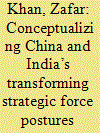

|
|
|
|
|
| Summary/Abstract |
As China and India gradually rise and become the centre point of world politics in the 21st century, both these nuclear states tend to transform their strategic force postures to hide their vulnerabilities and ensure the credibility of their deterrence force. This article conceptualizes the gradual transformation of China and India’s strategic force postures under the essentials of minimum deterrence. In doing so, it examines the conceptualization of minimum deterrence, doctrinal use of deterrent forces and the modernization of strategic forces, though the perceptional aspects of these three imperatives may differ between these two nuclear states. This article attempts to find out whether or not these strategic imperatives, in relation to their transformation of strategic force postures, are consistent with the essentials of minimum deterrence conceived here. This article concludes that if China and India’s deterrence force modernization falls within these essential categories (i.e. modernization, accuracy, upgrades, correcting ranges, credibility, penetrability, survivability), they may be consistent with minimum deterrence. Alternatively, if both China and India go beyond the minimum deterrence that they initially conceptualized, this may remain inconsistent with the minimum deterrence conceptualized here.
|
|
|
|
|
|
|
|
|
|
|
|
|
|
|
|
| 2 |
ID:
153391


|
|
|
|
|
| Summary/Abstract |
Immediately after Xi Jinping assumed the position of party secretary general, he launched a large-scale top-down antiwaste campaign amongst the Chinese cadre corps. Compared with similar policies announced by Xi’s predecessors, this campaign has distinct features that entail substantial political risk for the party secretary general. Why did Xi choose this politically risky strategy? Drawing on recent literature on authoritarian regimes, this article argues that, amongst all possible objectives, an authoritarian leader such as Xi can use this type of policy campaign to demonstrate his power. In particular, the inherent importance of informal politics, the recent developments in Chinese politics, and Xi’s personal background have increased his incentive and capacity to signal power by implementing such a campaign. A comparison with Xi’s two predecessors, interviews, and statistical analyses support this argument. The theoretical framework of this article also sheds light on the literature on the power sharing of authoritarian political elites.
|
|
|
|
|
|
|
|
|
|
|
|
|
|
|
|
| 3 |
ID:
153398
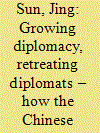

|
|
|
|
|
| Summary/Abstract |
This article examines the shrinking influence of the Chinese Ministry of Foreign Affairs (MFA) in China’s foreign policymaking, at a time when the country’s diplomatic needs are rapidly growing. By utilizing the theory of domestic sources of international relations, this article argues that the MFA has been under stress from all directions: sidestepped by Party leaders from the top, challenged by competing ministries horizontally, and mocked by the public from below. The article also assesses the consequences a marginalized MFA has brought to Chinese diplomacy.
|
|
|
|
|
|
|
|
|
|
|
|
|
|
|
|
| 4 |
ID:
153394


|
|
|
|
|
| Summary/Abstract |
A holism tendency in International Relations (IR) studies treats international systems and states as unitary wholes and thus leads to a tripartite view on China’s international role as either a revisionist, status quo or a pragmatist power. China’s stances in global financial governance (GFG), however, are inconsistent, which indicates that China is not a pure challenger or status quo power. These inconsistent stances do not allude to China being a pragmatist power, which makes policies and takes actions in a practical and matter-of-fact way without consistent national interests. Instead, China has inconsistent stances but consistent core national interests. The ostensible contradiction is due to the explanatory deficiency of the IR holistic tendency, which pays inadequate attention to fragmentations of international and domestic systems.
|
|
|
|
|
|
|
|
|
|
|
|
|
|
|
|
| 5 |
ID:
153390


|
|
|
|
|
| Summary/Abstract |
Xi Jinping swiftly centralized political power shortly after the 18th Chinese Communist Party (CCP) National Congress in 2012, opposing what was predicted when he was elected general secretary. This action also compromises China’s long-term efforts to avert an over-concentration of power among a few elites. This study deals with Xi’s strong ascent to power, defined as the result of institutional change in China’s political power game from the perspective of new institutionalism. The author identifies triggers of institutional change, ideas and norms introduced for changing informal institutions, and the actual transformation of formal institutions, arguing that Xi took advantage of social demand for reform coordination as well as some top elites’ serious political misbehavior to commence institutional change for the centralization of political power. To do so, Xi introduced new reform ideas – systemic thinking and top-down design, originating from complex systems theory – in the name of coordinating and comprehensively deepening reform. Xi eventually succeeded in justifying the centralization of power and the establishment of central organizations to deepen reforms comprehensively and coordinate internal and external security. As a result, Xi seized power while practically nullifying the principle of division of work.
|
|
|
|
|
|
|
|
|
|
|
|
|
|
|
|
| 6 |
ID:
153399


|
|
|
|
|
| Summary/Abstract |
After the Chinese central government announced a policy of raising retirement benefits in 2005, there ensued a race to the top in pension benefit growth among its 31 provincial units. This study seeks to explain how this seemingly unusual nationwide social welfare expansion came about in authoritarian China. It helps to open up the black box of mysterious Chinese politics. The study highlights the roles of sub-national governments in decentralized Chinese social welfare policymaking. Instead of treating authoritarian rulers as unitary actors, this study looks into the interplay of center and provinces in a decentralized authoritarian political system. Compared with the center, provinces have traditionally been more reluctant to devote economic resources to social welfare. To motivate provincial governments to implement a policy of increased benefits, the center granted fiscal subsidies to certain provinces. This special subsidy program had three effects: (1) it reduced the provincial costs of the benefit increase; (2) it elevated the center’s annual fiscal transfer base for subsidized provincial governments beyond the current year, into the future; and (3) it increased disposable personal income, a key indicator of local government officials’ political merits in the cadre evaluation system. Inter-provincial competition in raising retirement benefits is explained, first, by provinces’ desires to earn greater fiscal subsidies from the center; and, second, by the efforts of those provinces which did not receive the subsidies to keep their benefit levels up with the levels of those which did. The result of the center’s subsidy program was not only a rise in pension levels, but also an increase in inter-regional social welfare disparities. The central government, perhaps alarmed by the consequences of its policy, acted to bring the rapid expansion of pension levels to an apparent end in 2016.
|
|
|
|
|
|
|
|
|
|
|
|
|
|
|
|
| 7 |
ID:
153392
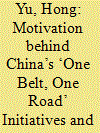

|
|
|
|
|
| Summary/Abstract |
The ‘One Belt, One Road’ (OBOR) initiatives form the centerpiece of the Chinese leadership’s new foreign policy. The OBOR initiatives are a reflection of China’s ascendance in the global arena, economically, politically, and strategically. Developing inter-connectivity of infrastructure development forms a central part of China’s OBOR initiatives. The Asian Infrastructure Investment Bank (AIIB) aims to facilitate and accelerate infrastructure improvement in the region by providing capital loans and technical services. The AIIB will serve as the spearhead of China’s OBOR initiatives. The AIIB and OBOR initiatives have put China at the center of geoeconomics and geopolitics in the region and beyond, a position from which it hopes to strengthen its economic ties with other Asian countries. The new Silk Road initiatives also provide a channel for Chinese companies and capital to invest in other countries by leveraging China’s strengths in infrastructure development, financial power and manufacturing capacity. The OBOR initiatives and the AIIB could change the economic and political landscape of Asia, the most dynamic and economically vibrant region of the twenty-first century. However, China faces serious challenges, both internally and externally, in implementing these initiatives.
|
|
|
|
|
|
|
|
|
|
|
|
|
|
|
|
| 8 |
ID:
153401
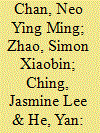

|
|
|
|
|
| Summary/Abstract |
While global commentators hail the unprecedented success of the Beijing Olympic Games, few have commented on the methods employed to promote urban development in China. This article develops a conceptual framework to unfold the Beijing Olympics and China’s mega-event urbanization model, which feature ‘playing games for leveraging land’. Literally, this informally translates to ‘concept creation’ and ‘land and finance leverage paradigm’. Based on a detailed investigation of the way China has dealt with mega-events such as the Olympics and the Asian Games, this article begins with an analysis on the well-known Chinese ‘land and leveraged finance’ model. However, it goes a step further to reveal a much bigger picture and brings to light the deeper underlying logic behind China’s ‘mega-event urbanization model’ as well as its legacy and consequence. It unfolds the intriguing relations between central and local governments; between functional/institutional systems (land, taxation and banking) in regard to territory and space; and between economic and political dynamics (local competition for both economic/GDP growth and individual political aspirations). This development model is unique to China and extraordinarily unconventional on a global scale which is unparalleled by any past experiences in other countries that have hosted the Olympic Games and other similar events. The ramifications of such ambitious and untested strategies could yield negative impacts on China’s long-term development and harm the world economy in the global scale.
|
|
|
|
|
|
|
|
|
|
|
|
|
|
|
|
| 9 |
ID:
153400
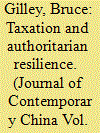

|
|
|
|
|
| Summary/Abstract |
Taxation provides important inferences about the nature of non-oil authoritarian regimes. This article looks at taxation to understand the ruling Chinese Communist Party’s relationship to society. It finds that the party has maintained fiscal capacity through non-intrusive transactional taxes that allow it to deliver more services in wealthier areas where potential dissent is greatest. This model is reaching its limits because of its negative impacts on economic growth and social equity. Attempts to expand new taxation sources—such as property value taxes or progressive and comprehensive personal income taxes—are difficult because of the prior reliance on transactional taxes. As a result, the CCP will rationally continue to rely on inefficient and inequitable taxation because of the political costs of pursuing a modern taxation system. The China case is indicative of the fiscal dynamics of durable authoritarian regimes.
|
|
|
|
|
|
|
|
|
|
|
|
|
|
|
|
| 10 |
ID:
153395


|
|
|
|
|
| Summary/Abstract |
There has been much speculation about whether China will democratize and avoid conflict with India in the twenty-first century. Yet, few studies have investigated how contemporary Chinese view India and its democracy. Addressing this gap in the literature, the authors examined Chinese media coverage of India’s two-month long April–May 2014 parliamentary election, the largest election in world history, through systematic analysis of over 500 articles from ten major mass media outlets and over 27,000 messages transmitted on Sina Weibo social media. As might be expected, Chinese mass media generally portrayed India and its elections in a condescending fashion while avoiding discussion of ‘democracy’. However, the authors found a much broader array of viewpoints on Chinese social media including considerable praise for Indian Prime Minister Narendra Modi and extensive discussion about the intrinsic and instrumental merits of democracy both in India and in general.
|
|
|
|
|
|
|
|
|
|
|
|
|
|
|
|
|
|
|
|
|